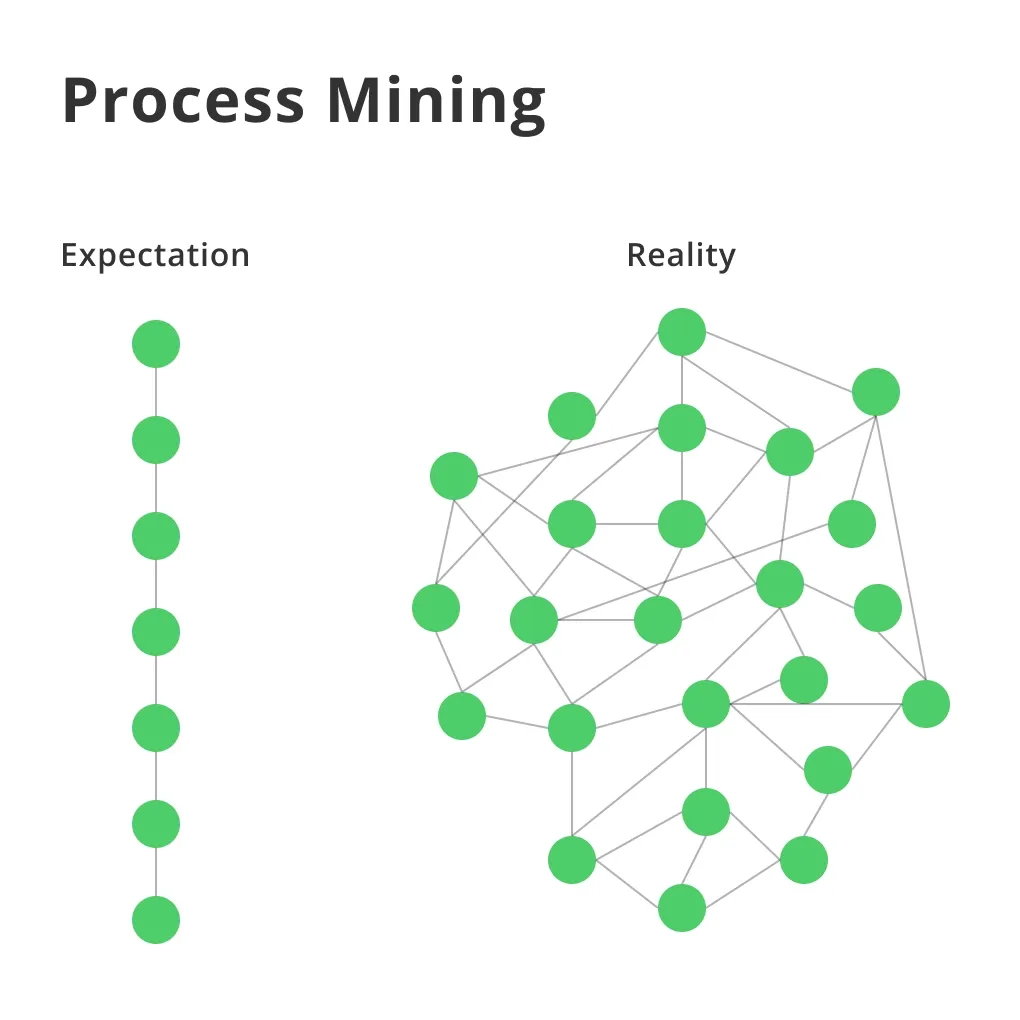What is Process Mining?
Process Mining is a branch of data science that focuses on the analysis of event logs to understand the process within an enterprise.
Origin
The concept of process mining was first conceived in the late 1990s, combining methods from fields like data mining, machine learning, and business process modeling.
Purpose
This powerful analytic and visualizing tool helps organizations discover, monitor, and improve their business processes, leading to increased efficiency and improved workflow.
Components
Process mining typically involves three core components — event logs (data), process mining software (technology), and analysis methodology.
Connection with Business Process Management
Process Mining bears a friendly association with Business Process Management— it can be perceived as an extension of BPM, providing valuable insights that help in optimizing the business process.
Who Uses Process Mining?
Now, let's discuss the various entities that extract value from Process Mining.
Companies
A multitude of companies, cater to different industries, use process mining to streamline operations and identify process bottlenecks.
Audit and Compliance Bodies
Audit and compliance organizations leverage process mining to check adherence to regulations and policies.
Data Analysts
For data analysts, process mining is a powerful tool to pull important insights from massive datasets, improving their understanding of processes.
IT Professionals
IT professionals often use process mining to understand how software and IT systems are being utilized in a company.
Business Consultants
Business consultants employ process mining to gain a clear picture of a company's operations, which aids in devising strategies for business improvement.
Why is Process Mining Used?
Let's delve into the reasons that make Process Mining an essential tool in today's data-driven world.
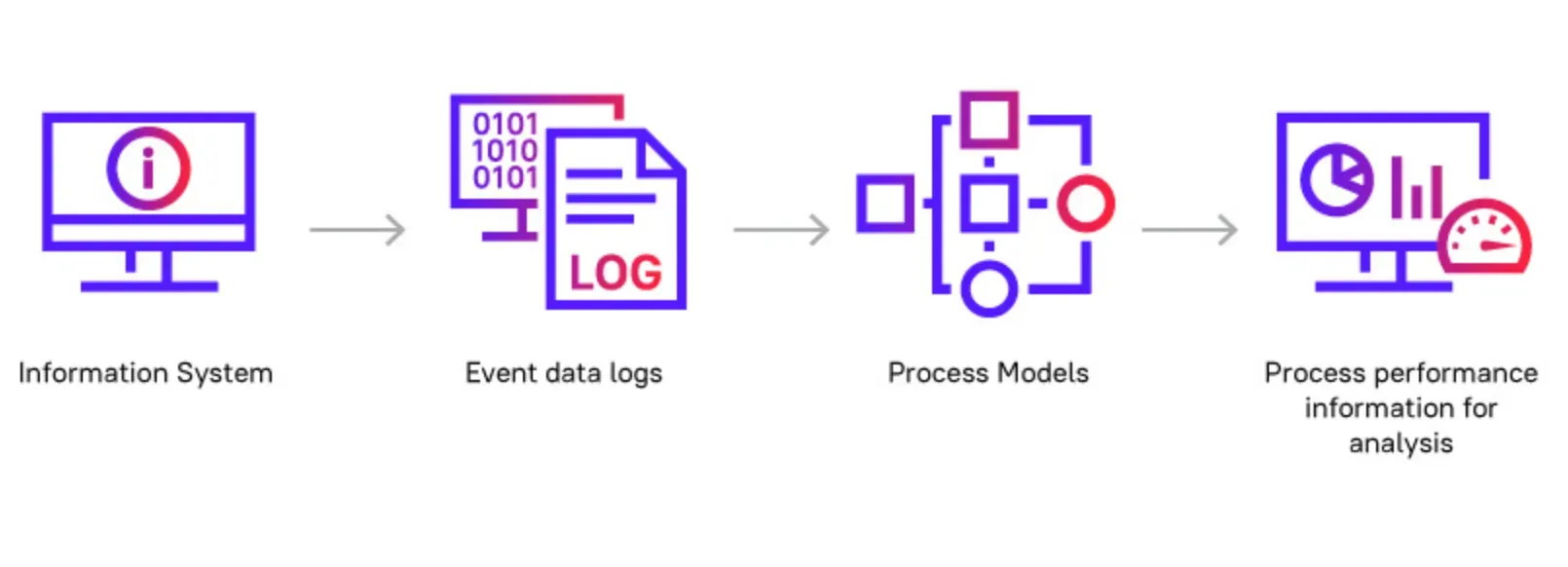
Transparency in Operations
Process mining provides full transparency to actual business operations, bypassing the often fragmented and subjective perception based on stakeholders’ viewpoints.
Process Improvement
Process mining identifies opportunities for process optimization, eventually leading to cost savings and efficiency gains.
Compliance Verification
The technique proves valuable in verifying if operations comply with intended procedures and regulations.
Gap Identification
It helps reveal the gap between 'as-is' and 'to-be' scenarios in business processes.
Fault Localization
Process mining aids in pinpointing precisely where and why issues or bottlenecks occur within a process.
When is Process Mining Used?
There are specific situations when Process Mining becomes the tool of choice.
Audit Purposes
Process mining is used to carry out audits as it provides a transparent, complete view of the business process.
Monitoring Real-Time Activities
The tool is employed when there is a need to monitor activities and processes in real-time.
Business Transformation
During business transformation or reengineering attempts, process mining plays a key role in understanding existing processes and identifying areas of improvement.
Operations Management
Process mining ushers value in daily operations management by foreseeing bottlenecks and highlighting probable solutions.
ERP System Implementation
The deployment of ERP systems often necessitates the use of process mining to map existing processes.
How is Process Mining Implemented?
Let's walk you through the steps involved in implementing a Process Mining project.
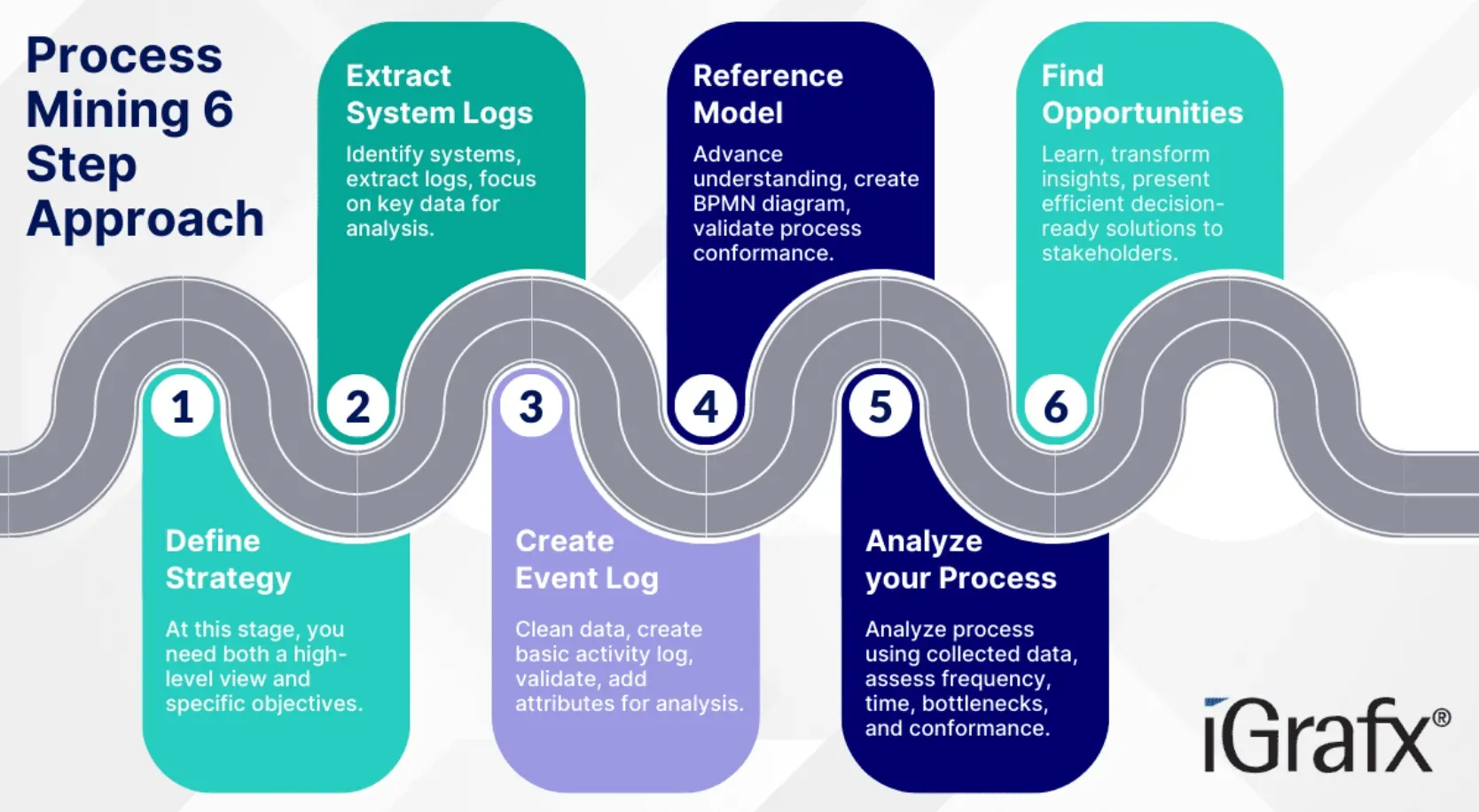
Selecting Process
The first step involves identifying which process will be analyzed via process mining.
Extracting Event Log
The next crucial step is to extract the event log from the system that registers the events for the selected process.
Data Preparation
The data needs to be sanitized and structured properly before being fed into the process mining tool.
Analysis Execution
Next, the process mining tool analyzes the prepared data, creating visualizations and key metrics.
Insights Interpretation and Action
The final step involves interpreting the results and proposing actions to enhance the operations based on the insights gained.
Assumptions in Process Mining
While utilizing Process Mining, certain assumptions are taken into consideration.
Quality of the Event Logs
It is believed that the quality of event logs is good, which means logs are complete, correct, and consistent.
Representation of Reality
Process mining assumes that the event logs accurately reflect the actual process that is happening.
Case ID Assumption
It's assumed that every process instance or case has a unique identifier.
Timestamp Assumption
Another critical assumption is that all events in the event log are correctly timestamped.
Event Ordering Assumption
The last key assumption is that the ordering of the events in the event log correctly represents the order in which they occurred in the real-world process.
Best Practices in Process Mining
There are certain best practices that can maximize the utility of Process Mining.
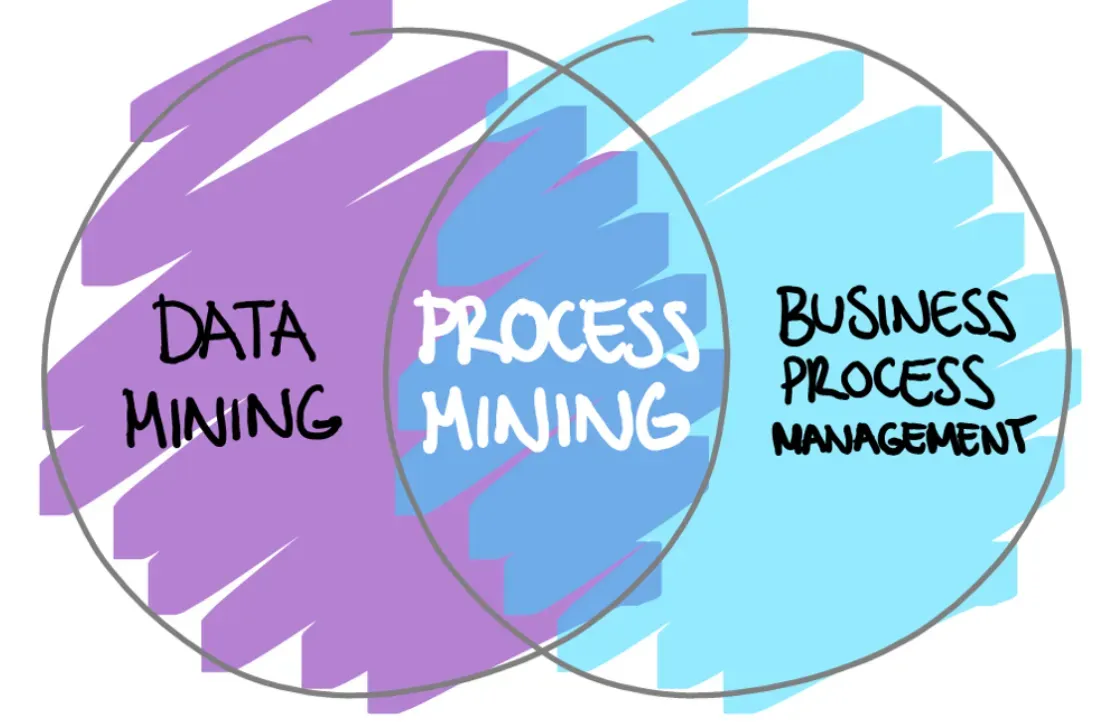
Collaboration Between Teams
Cross-functional collaboration can bring about higher efficacy in process mining projects.
Regular Auditing
A process should be audited using process mining on a regular basis to maintain consistent functionality.
Clean, Sanitized Data
Data cleanliness and proper data formatting are essential for reliable results in process mining.
Use Interpretation Instead of Pure Analysis
The insights derived should be interpreted within the context of the business, not just based on pure analysis.
Long-term Deployment
Continuous usage of process mining rather than one-off projects would provide greater benefits in managing and optimizing business processes.
Challenges in Process Mining
Despite its utility, Process Mining does come with its own set of challenges.
Data Quality and Completeness
Inaccurate, incomplete data can lead to misleading results rendering the process mining efforts fruitless.
Understanding and Interpreting Results
Understanding and interpreting the results correctly is often challenging due to the complex visualizations generated by process mining tools.
Technical Expertise
Process mining demands a certain degree of technical expertise which poses a barrier to many businesses.
Privacy Concerns
As process mining uses event logs that might contain sensitive information, privacy concerns can arise.
Infrastructure Requirements
Implementing process mining requires specific technological infrastructure and data capture mechanisms, a lack of which can pose a challenge.
Trends in Process Mining
Lastly, let’s dive into the trends that are shaping the future of Process Mining.
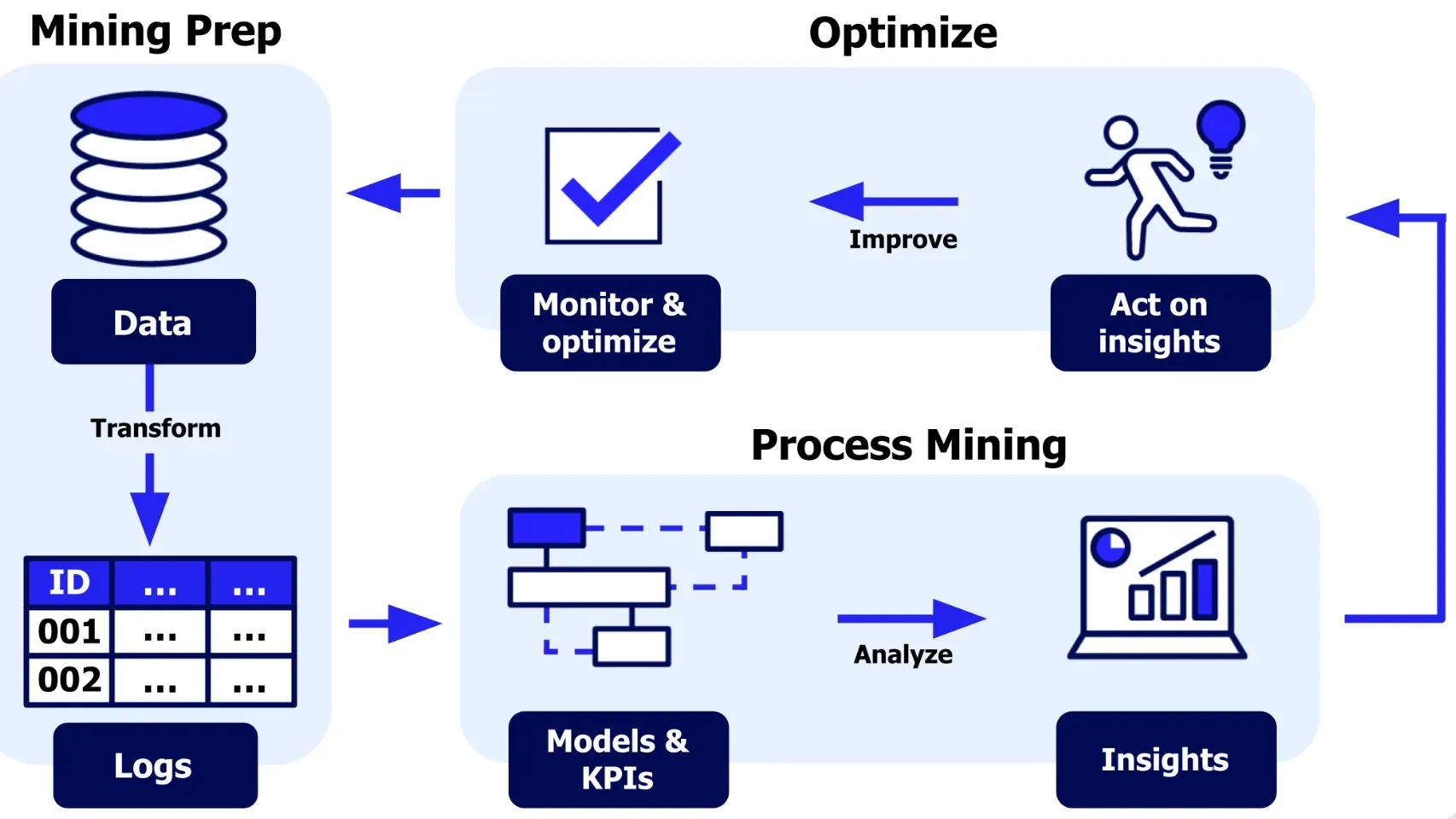
Automation of Process Discovery
The growing trend of automating process discovery using AI will make process mining even more powerful.
Real-Time Process Mining
The shift towards real-time process mining is accelerating, as businesses want immediate insights into their processes.
Integration with Other Tech Fields
Integration of process mining with technologies like Machine Learning, Predictive Analytics, and Artificial Intelligence is a significant trend.
Expanding Use Cases
Process mining is finding its usage in new domains such as healthcare, logistics, and the public sector, which is an ongoing trend.
Enhanced User Experience
Efforts are also being made to enhance user experience with process mining tools by making them more intuitive and easy to use.
Frequently Asked Questions (FAQs)
How does process mining differ from data mining?
While data mining extracts useful patterns from large data sets, process mining specifically focuses on analyzing event logs to improve and understand real business processes.
Can process mining identify bottlenecks in a process?
Yes, process mining can uncover inefficiencies, including bottlenecks, by analyzing the sequence and duration of events in a process.
How does process mining support compliance checking?
Process mining helps ensure compliance by comparing the actual processes reflected in event logs against pre-defined models or regulations, revealing deviations.
In what ways can process mining enhance customer experience?
By optimizing processes for efficiency and effectiveness, process mining can lead to faster response times and more personalized customer service interactions.
How is Process Mining Applied in Healthcare?
In healthcare, process mining analyzes patient flow, treatment processes, and administrative operations to improve patient care and operational efficiency.
